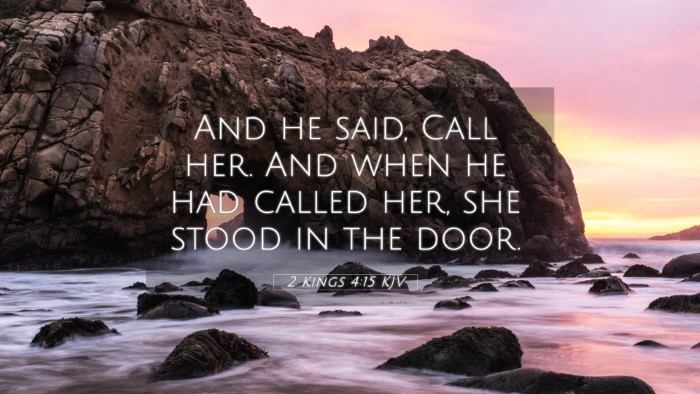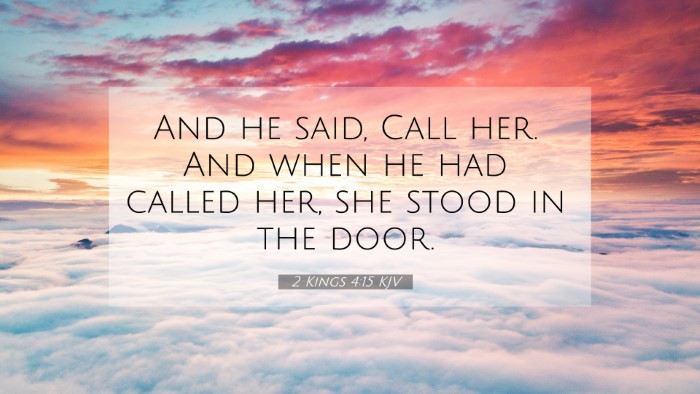Understanding 2 Kings 4:15
“So he said, ‘Call her.’ When he had called her, she stood in the doorway.” (2 Kings 4:15, ESV)
Summary of the Verse
This verse is part of a narrative surrounding the prophet Elisha and a Shunammite woman who had shown him great hospitality. Elisha, recognizing her kindness, desires to bless her in return. By calling her into the doorway, a place of honor, Elisha prepares to reveal a message from God.
Thematic Insights from Public Domain Commentaries
- Matthew Henry:
Henry emphasizes the Shunammite woman's humility and grace. Her presence in the doorway signifies not only her willingness to serve but also a threshold of blessing, a space for divine communication between God’s messenger and His chosen people.
- Albert Barnes:
Barnes highlights the importance of recognition in this verse. Elisha acknowledges the woman’s presence, demonstrating that God remembers the deeds of His faithful servants. This moment precedes God’s revelation and blessing promised to the woman.
- Adam Clarke:
Clarke draws attention to the cultural implications of the doorway as a significant place. It symbolizes openness and invitation, showcasing the act of calling implying a forthcoming blessing or a prophetic announcement from Elisha.
Cross-References in the Bible
This verse has notable connections to other biblical texts, which help to deepen the understanding of its themes. Here are some relevant cross-references:
- 1 Kings 17:8-16: The story of the widow of Zarephath illustrates God’s provision through the prophet Elijah, paralleling Elisha’s blessings.
- 2 Kings 4:1-7: The account of another widow shows Elisha's role as a source of hope and provision for those in distress.
- James 1:17: "Every good gift and every perfect gift is from above," highlighting the nature of God's blessings through His servants.
- Matthew 10:41: Jesus acknowledges that those who receive a prophet will receive a prophet's reward, illustrating the significance of the Shunammite woman’s actions.
- Hebrews 13:2: "Do not neglect to show hospitality to strangers," reinforcing the virtue of hospitality found in the Shunammite’s character.
- 1 Samuel 9:6: The calling of Samuel shows how God directs events through the obedience of His servants, similar to Elisha’s actions.
- Luke 1:38: Mary’s acceptance of God’s message reflects the humility and readiness shown by the Shunammite woman in this passage.
Interpreting the Verse in a Broader Context
This verse is crucial as it sets the stage for significant blessings in the Shunammite woman's life that follow. The act of calling her marks a pivotal moment where the prophet acts as an intermediary, allowing God's will to manifest through a prophetic announcement. The doorway symbolizes a point of transition from the ordinary to the extraordinary, where divine intervention occurs.
The Role of Cross-Referencing in Understanding Biblical Texts
Cross-referencing biblical texts enhances the understanding of scripture by revealing underlying themes and connections. For instance, the act of hospitality shown by the Shunammite woman can be explored further through cross-referenced passages that deal with kindness and divine reward throughout the Bible. By employing tools for Bible cross-referencing, such as a Bible concordance or a cross-reference Bible study guide, readers can navigate the intricate web of biblical narratives that offer deeper insights into individual verses.
Conclusion
The verse 2 Kings 4:15 not only reveals the significance of hospitality but also exemplifies the blessings that come from recognizing God's messengers. Through the lens of public domain commentaries and contextual cross-referencing, we can appreciate the profound interconnectedness of biblical narratives and their teachings, empowering readers to explore themes that span both the Old and New Testaments.


